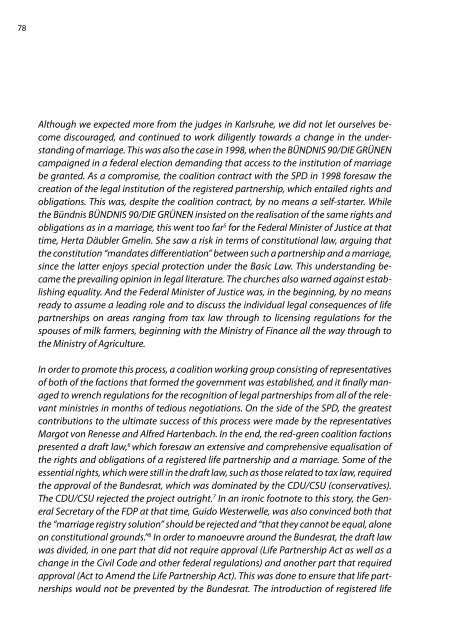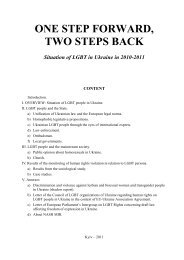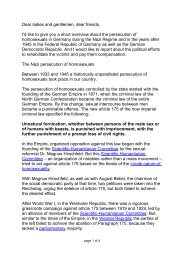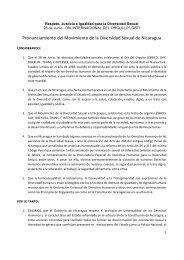Vom Verbot zur Gleichberechtigung - Hirschfeld-Eddy-Stiftung
Vom Verbot zur Gleichberechtigung - Hirschfeld-Eddy-Stiftung
Vom Verbot zur Gleichberechtigung - Hirschfeld-Eddy-Stiftung
Sie wollen auch ein ePaper? Erhöhen Sie die Reichweite Ihrer Titel.
YUMPU macht aus Druck-PDFs automatisch weboptimierte ePaper, die Google liebt.
78<br />
Although we expected more from the judges in Karlsruhe, we did not let ourselves become<br />
discouraged, and continued to work diligently towards a change in the understanding<br />
of marriage. This was also the case in 1998, when the BÜNDNIS 90/DIE GRÜNEN<br />
campaigned in a federal election demanding that access to the institution of marriage<br />
be granted. As a compromise, the coalition contract with the SPD in 1998 foresaw the<br />
creation of the legal institution of the registered partnership, which entailed rights and<br />
obligations. This was, despite the coalition contract, by no means a self-starter. While<br />
the Bündnis BÜNDNIS 90/DIE GRÜNEN insisted on the realisation of the same rights and<br />
obligations as in a marriage, this went too far 5 for the Federal Minister of Justice at that<br />
time, Herta Däubler Gmelin. She saw a risk in terms of constitutional law, arguing that<br />
the constitution “mandates differentiation” between such a partnership and a marriage,<br />
since the latter enjoys special protection under the Basic Law. This understanding became<br />
the prevailing opinion in legal literature. The churches also warned against establishing<br />
equality. And the Federal Minister of Justice was, in the beginning, by no means<br />
ready to assume a leading role and to discuss the individual legal consequences of life<br />
partnerships on areas ranging from tax law through to licensing regulations for the<br />
spouses of milk farmers, beginning with the Ministry of Finance all the way through to<br />
the Ministry of Agriculture.<br />
In order to promote this process, a coalition working group consisting of representatives<br />
of both of the factions that formed the government was established, and it finally managed<br />
to wrench regulations for the recognition of legal partnerships from all of the relevant<br />
ministries in months of tedious negotiations. On the side of the SPD, the greatest<br />
contributions to the ultimate success of this process were made by the representatives<br />
Margot von Renesse and Alfred Hartenbach. In the end, the red-green coalition factions<br />
presented a draft law, 6 which foresaw an extensive and comprehensive equalisation of<br />
the rights and obligations of a registered life partnership and a marriage. Some of the<br />
essential rights, which were still in the draft law, such as those related to tax law, required<br />
the approval of the Bundesrat, which was dominated by the CDU/CSU (conservatives).<br />
The CDU/CSU rejected the project outright. 7 In an ironic footnote to this story, the General<br />
Secretary of the FDP at that time, Guido Westerwelle, was also convinced both that<br />
the “marriage registry solution” should be rejected and “that they cannot be equal, alone<br />
on constitutional grounds.” 8 In order to manoeuvre around the Bundesrat, the draft law<br />
was divided, in one part that did not require approval (Life Partnership Act as well as a<br />
change in the Civil Code and other federal regulations) and another part that required<br />
approval (Act to Amend the Life Partnership Act). This was done to ensure that life partnerships<br />
would not be prevented by the Bundesrat. The introduction of registered life











